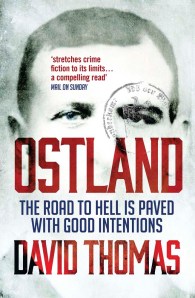Ostland - David Thomas
 Ostland by David Thomas is a harrowing and haunting novel based on the true story of Georg Heuser, a morally upright, ambitious and blandly likeable young murder detective in Berlin who hunts a serial killer known as the S-Bahn murderer – and who subsequently becomes a war criminal, responsible for tens of thousands of deaths.
Ostland by David Thomas is a harrowing and haunting novel based on the true story of Georg Heuser, a morally upright, ambitious and blandly likeable young murder detective in Berlin who hunts a serial killer known as the S-Bahn murderer – and who subsequently becomes a war criminal, responsible for tens of thousands of deaths.
It’s a book that dwells at the edges of crime fiction. Thomas uses the genre as a kind of frame of reference, a yardstick for our conceptions of good and evil, and the whole book is an extended exercise in dramatic irony.
In the first breathless section of the novel Heuser and his detective colleagues close in on the notorious killer who murdered and raped women along the city’s train routes during the early part of the Second World War. With the criminal’s capture, Heuser and his team become heroes. But the young detective is subsequently transferred to the Russian front, to the German territory known as Ostland, and Heuser’s own shocking descent into inhumanity and depravity begins.
The detail of Heuser’s crimes is often sickening, but Ostland is written in a very understated way – Heuser is an honest narrator, wearyingly explicit about his own actions. Heuser’s early idealism, his determination to catch a depraved killer is weighed time and again against his own later actions and motivations.
The crimes of the S-Bahn killer soon pale into insignificance against the mechanized, industrial slaughter perpetrated by the Nazis. At one point a character describes the Final Solution as the ‘biggest criminal conspiracy in history.’ Despite their so-called crusade, the Nazis were always careful to conceal their sickening crimes from the world.
Heuser finds himself ensnared in a system that has become as sick and deranged as the killer he once pursued and he doesn’t know what to do, so he does nothing. He becomes complicit. Ostland asks us all sorts of questions about what it takes to make a normal man into a brutal monster and we are invited to consider what we ourselves would do in the same situation.
Ostland is not an easy read in many ways, but it’s certainly compelling. It’s a one-way trip: as Heuser’s remorseless descent unfolds, as every terrible act is revealed in sickening detail, we know that there can never be any redemption for this man, and little justice for the millions who died. A subplot about a pair of war crimes prosecutors investigating Heuser provides a last sardonic coda.
This is also a book that asks questions about our own love of crime fiction, and the cheerful slaughter of innocent men, women and children. We read the genre, we enjoy it, with barely a thought to the unimaginable consequences of murder. The hunt for the S-Bahn murderer in the first part of the book is a thrilling ride, but multiply that slaughter by thousands, by millions, and we are sickened.
What I liked: Any novel is going to stick with you if it has an underlying theme. Theme is the dark matter that binds a novel together. It’s a simple statement, or a question that the author is trying to answer – in Ostland, Thomas asks what turns a good man into a monster? – and it connects every line of dialogue, every sentence and paragraph, every chapter, every image in your head. It doesn’t matter what genre you’re writing – literary, crime, YA, sci-fi – a theme rippling beneath the surface of a story – a statement to be analysed, or a question to be answered - will always give a novel more resonance.
Many thanks to Quercus Books for the review copy.

